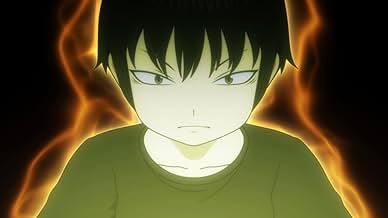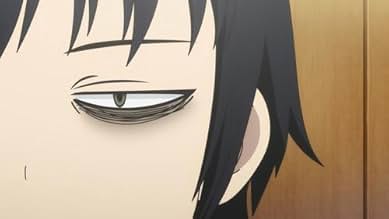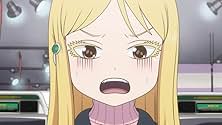CALIFICACIÓN DE IMDb
7.9/10
2.5 k
TU CALIFICACIÓN
Las aventuras divertidas y románticas de un par de niños apasionados por los juegos en 1991 en Japón.Las aventuras divertidas y románticas de un par de niños apasionados por los juegos en 1991 en Japón.Las aventuras divertidas y románticas de un par de niños apasionados por los juegos en 1991 en Japón.
- Premios
- 2 nominaciones en total
Explorar episodios
Netflix's Anime Series and Movies, Ranked
Netflix's Anime Series and Movies, Ranked
We've rounded up every anime series and movie we could find — created or distributed by Netflix — to see which ones rank the highest, according to IMDb users.
Argumento
¿Sabías que…?
- TriviaIn 2014, the Square Enix (FF, Dragon Quest, Kingdom of hearts) offices were searches by the Osaka Police. This was due to an infringement of copyright of the SNK company (responsible for games such as King of fighters, Metal Slug, Samurai Shodown). Since August 2015, they reached an agreement out of court and the manga/anime can now use their IP.
Opinión destacada
The series is a loveletter to the 90s era of arcades and a coming of age tale of love between two girls and a boy. Harou is a young boy in elementary school in 1991, he's bullied by both teachers and classmates alike, told he's worthless and has no skills. So he seeks escapism in the fantasy of the game centers of Japan, while it would seem like he has little skills in life, at video games he's a pro. But one day he comes up against an opponent that utterly destroys him in his favorite game (Street Fighter II), only to find out that his opponent is a classmate of his .. and a girl. What's more she's a rich girl who he sees as an outsider in his world of escapism, so he uses exploitative strategy against her which starts off their love-hate relationship.
Her name is Oono Akira, a mute girl who feels like she is being crushed under the responsibilities of being the heir to the family business, and also seeks escapism for this reason. The two of them form a bond together, but her future has been planned since the day she was born with talk of an arranged marriage when she reaches maturity. Can Harou and Akira survive together? What's more, entering into the mix is another girl named Hidaka who, like Akira, resents and even hates Harou at first, but is also touched by Harou's kind (if stupid and oblivious) nature, and learns to stop worrying quite as much about the hardships of life and have fun... And along the way loses her heart to him. But what about Akira? Well that's up to you to find out.
Described as a "love comedy" as opposed to "romantic comedy" by the author, the series plays through cycles which is frustrating until finally beginning in the third cycle the protagonist finally asks himself "why do I keep resetting to zero?" at which point I couldn't help but exclaim "YES, WHY?" There's a greenlit second season in October of this year (2019), though the series is already completed in manga form at a rather light 63 chapters at 10 volumes. One could probably read through the whole thing in a single day if they were truly inclined. Which I set out to do, I did not successfully read it in one day, but that's neither here nor there.
Having watched the anime and not wanting to wait til October (though I'll watch the second season anyway), I decided to investigate the manga. And I was rather shocked by what I found. While the anime was mostly faithful and unswerving from most of the anime, the anime actually omits contextual scenes from the manga. For example, Akira who is mute and thus is never able to say words to express herself has a few scenes in the manga where her thoughts are conveyed. By denying her thoughts, she is denied of any real agency in the anime and thus we're forced to try and understand her reasoning when she blankly looks at something. Perhaps they will go back in season 2 and reveal these scenes of agency, but I felt the need to deduct a point for this because I found that to be frustrating.
The two characters I enjoyed most were Hidaka and Akira (not in any particular order, it'd be hard to pick one over the other). Harou's otaku (obsessive) nature makes him a character that I found hard to like, as he misses the obvious all the time, and when trying to express himself can't help but go into a roundabout conversation about some video game. I get that it's exaggerated on purpose, but that doesn't really make it better.
The OP I didn't much care either way, but that outro song is so good that I found it frustrating when Netflix kept trying to skip it. If you like love stories, this is quite possibly the most unconventional one I've ever seen. I liked it so much I decided I wanted to read the manga so that I didn't miss anything. Definitely worth a watch. Hidaka is lovable, and Akira are adorable, and any time they're on the screen you'll find yourself rooting for them.
Also of note, this anime does not rely on sexuality or fanservice of any kind. There's a couple of throwaway jokes here, and in the manga Hidaka's point of view on the sexism in the Game Centers makes sense, but Netflix chose to leave that particular scene out and focus on character development, if only they had taken the time to keep Akira's agency intact, considering how little of it there is.
Her name is Oono Akira, a mute girl who feels like she is being crushed under the responsibilities of being the heir to the family business, and also seeks escapism for this reason. The two of them form a bond together, but her future has been planned since the day she was born with talk of an arranged marriage when she reaches maturity. Can Harou and Akira survive together? What's more, entering into the mix is another girl named Hidaka who, like Akira, resents and even hates Harou at first, but is also touched by Harou's kind (if stupid and oblivious) nature, and learns to stop worrying quite as much about the hardships of life and have fun... And along the way loses her heart to him. But what about Akira? Well that's up to you to find out.
Described as a "love comedy" as opposed to "romantic comedy" by the author, the series plays through cycles which is frustrating until finally beginning in the third cycle the protagonist finally asks himself "why do I keep resetting to zero?" at which point I couldn't help but exclaim "YES, WHY?" There's a greenlit second season in October of this year (2019), though the series is already completed in manga form at a rather light 63 chapters at 10 volumes. One could probably read through the whole thing in a single day if they were truly inclined. Which I set out to do, I did not successfully read it in one day, but that's neither here nor there.
Having watched the anime and not wanting to wait til October (though I'll watch the second season anyway), I decided to investigate the manga. And I was rather shocked by what I found. While the anime was mostly faithful and unswerving from most of the anime, the anime actually omits contextual scenes from the manga. For example, Akira who is mute and thus is never able to say words to express herself has a few scenes in the manga where her thoughts are conveyed. By denying her thoughts, she is denied of any real agency in the anime and thus we're forced to try and understand her reasoning when she blankly looks at something. Perhaps they will go back in season 2 and reveal these scenes of agency, but I felt the need to deduct a point for this because I found that to be frustrating.
The two characters I enjoyed most were Hidaka and Akira (not in any particular order, it'd be hard to pick one over the other). Harou's otaku (obsessive) nature makes him a character that I found hard to like, as he misses the obvious all the time, and when trying to express himself can't help but go into a roundabout conversation about some video game. I get that it's exaggerated on purpose, but that doesn't really make it better.
The OP I didn't much care either way, but that outro song is so good that I found it frustrating when Netflix kept trying to skip it. If you like love stories, this is quite possibly the most unconventional one I've ever seen. I liked it so much I decided I wanted to read the manga so that I didn't miss anything. Definitely worth a watch. Hidaka is lovable, and Akira are adorable, and any time they're on the screen you'll find yourself rooting for them.
Also of note, this anime does not rely on sexuality or fanservice of any kind. There's a couple of throwaway jokes here, and in the manga Hidaka's point of view on the sexism in the Game Centers makes sense, but Netflix chose to leave that particular scene out and focus on character development, if only they had taken the time to keep Akira's agency intact, considering how little of it there is.
- Emhilradim
- 4 ago 2019
- Enlace permanente
Selecciones populares
Inicia sesión para calificar y agrega a la lista de videos para obtener recomendaciones personalizadas
- How many seasons does Hi Score Girl have?Con tecnología de Alexa
Detalles
- Tiempo de ejecución25 minutos
- Color
Contribuir a esta página
Sugiere una edición o agrega el contenido que falta

Principales brechas de datos
By what name was Hi Score Girl (2018) officially released in Canada in English?
Responda
























